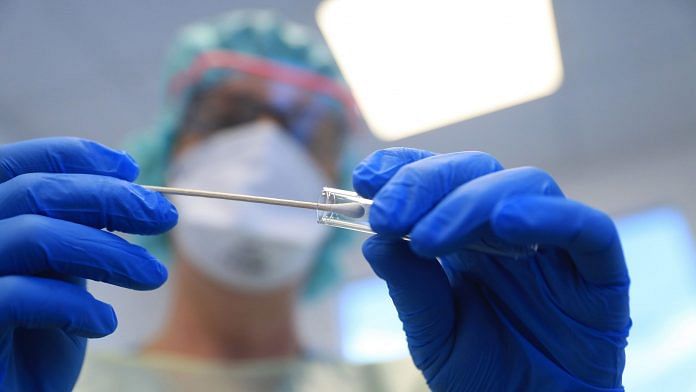New Delhi: India will go ahead with its decision to use imported antibody rapid diagnostic kits for testing in Covid-19 clusters after they arrive over the next couple of days even as the World Health Organisation (WHO) recommended against the usage of these tests outside research settings.
Speaking at a press meet Saturday, Indian Council of Medical Research (ICMR) chief epidemiologist Raman Gangakhedkar said India will do rapid testing to detect exposure in hotspots and will follow it up with real time-polymerase chain reaction (RT-PCR) tests.
The move came three days after the WHO published a scientific brief that said current evidence suggests rapid testing kits – whether based on antibody or antigen detection – were to be used only in research settings. “They should not be used in any other setting, including for clinical decision-making, until evidence supporting use for specific indications is available.”
Rapid antibody tests are prick based tests that provide quick results and don’t need to be conducted in laboratories. These tests can detect the presence of coronavirus antibodies in the body. However, since the antibodies appear only 7-10 days after a patient gets infected, the tests can detect exposure to the virus but cannot be used for diagnosis, according to the WHO.
The ICMR had approved the use of rapid antibody tests on 4 April in areas reporting Covid-19 clusters, large migration and evacuees. Following this, lists of kits validated by the ICMR and Drug Controller General of India were released.
ThePrint reached ICMR Director General Balram Bhargava for a comment but there was no response until the time of publishing this report.
Also read: What is rapid antibody test that India has cleared for Covid-19 and how it will help
Why India want to use these tests
Speaking to the press Saturday, Gangakhedkar said India aims to use the rapid diagnostic tests in hotspots to understand how many people have been infected, and to compare day wise trends.
“This can help us to understand how effective the containment measures were,” said Gangakhedkar.
Secondly, healthcare workers will be tested to understand if they are infected. “If there is a healthcare worker who tests positive and is RT-PCR negative and then the person is immune to the virus… Be assured that he or she will not spread it to others,” said the ICMR epidemiologist.
He added that rapid antibody tests are first-generation, which means they are new and will get as effective as other diagnostic tests with time.
An official working on Covid-19 crisis in Kerala told ThePrint on condition of anonymity that the state plans to use rapid diagnostic tests for surveillance but not screening. However, a Rajasthan who didn’t wish to be named said these tests will be used as they are approved by ICMR and will help isolate positive cases quickly.
Also read: Antibody test or RT-PCR. Both needed to fight Covid-19. Don’t rake up controversies
Poor results in UK, Spain and Czech Republic
The WHO brief on 8 April said antibody tests kits detect the presence of the virus only in the second week of the infection so can’t be used as confirmatory tests. Also, since the tests can cross-react with other pathogens, including other human coronaviruses, they often give false-positive results.
The brief added that there is no evidence to support the use of the rapid diagnostic tests to predict immunity of the person to the virus.
The United Kingdom government had intended to use rapid diagnostic tests to know the spread of the disease and detect how many have immunity to the virus and can safely go back to work. However, a validation study by the University of Oxford involved multiple rapid diagnostic tests and found that none of them performed well, giving many false positives and negatives.
Since then, the UK has cancelled its order of rapid testing kits and has tried recovering its costs. Similar rapid diagnostic tests failures have been reported in Spain, the Czech Republic and Slovakia.
Also read: Scientists dissect the genetic architecture of SARS-CoV-2, to understand how it replicates




WHO has no credibility left, it has been deeply corrupted by China. Do not trust anything they say. India and other countries should just ignore WHO and do their own thing. I hope to see the day when the entire leadership of WHO is prosecuted in a New York federal court and put behind bars for the rest of their lives.
WHO should just shut up and let it leave to the Govts to decide what is best for the country.
If the rest of the world was to adhere to WHO guidelines then all of us would be in a similar or worse situation than Italy & Spain.